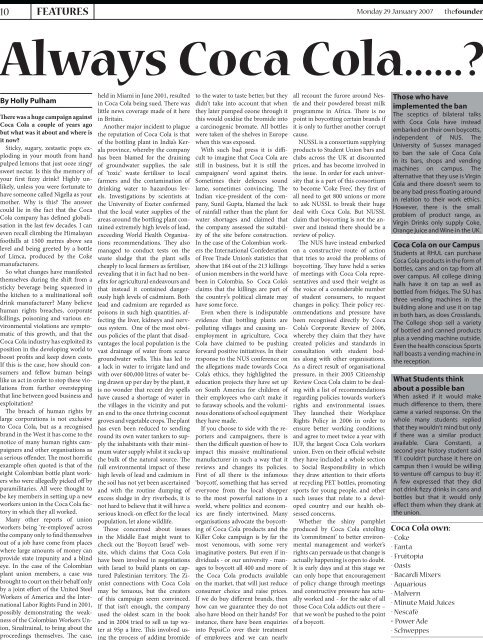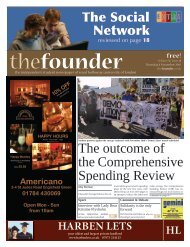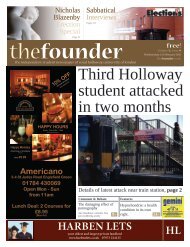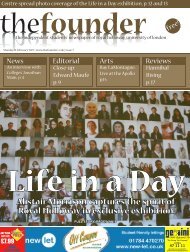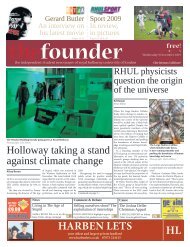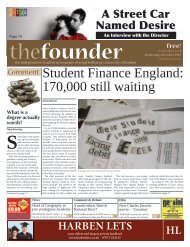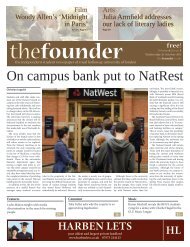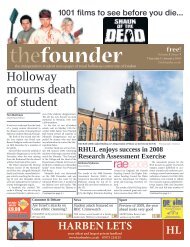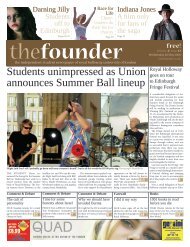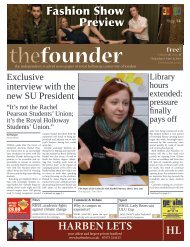GM FORECASTS RADICAL CHANGE - The Founder
GM FORECASTS RADICAL CHANGE - The Founder
GM FORECASTS RADICAL CHANGE - The Founder
You also want an ePaper? Increase the reach of your titles
YUMPU automatically turns print PDFs into web optimized ePapers that Google loves.
10 FEATURES Monday 29 January 2007 thefounder<br />
Always Coca Cola......?<br />
By Holly Pulham<br />
<strong>The</strong>re was a huge campaign against<br />
Coca Cola a couple of years ago<br />
but what was it about and where is<br />
it now?<br />
Sticky, sugary, zestastic pops exploding<br />
in your mouth from hand<br />
pulped lemons that just ooze zingy<br />
sweet nectar. Is this the memory of<br />
your first fizzy drink? Highly unlikely,<br />
unless you were fortunate to<br />
have someone called Nigella as your<br />
mother. Why is this? <strong>The</strong> answer<br />
could lie in the fact that the Coca<br />
Cola company has defined globalisation<br />
in the last few decades. I can<br />
even recall climbing the Himalayan<br />
foothills at 1500 metres above sea<br />
level and being greeted by a bottle<br />
of Limca, produced by the Coke<br />
manufacturers.<br />
So what changes have manifested<br />
themselves during the shift from a<br />
sticky beverage being squeezed in<br />
the kitchen to a multinational soft<br />
drink manufacturer? Many believe<br />
human rights breaches, corporate<br />
killings, poisoning and various environmental<br />
violations are symptomatic<br />
of this growth, and that the<br />
Coca Cola industry has exploited its<br />
position in the developing world to<br />
boost profits and keep down costs.<br />
If this is the case, how should consumers<br />
and fellow human beings<br />
like us act in order to stop these violations<br />
from further overstepping<br />
that line between good business and<br />
exploitation?<br />
<strong>The</strong> breach of human rights by<br />
large corporations is not exclusive<br />
to Coca Cola, but as a recognised<br />
brand in the West it has come to the<br />
notice of many human rights campaigners<br />
and other organisations as<br />
a serious offender. <strong>The</strong> most horrific<br />
example often quoted is that of the<br />
eight Colombian bottle plant workers<br />
who were allegedly picked off by<br />
paramilitaries. All were thought to<br />
be key members in setting up a new<br />
workers union in the Coca Cola factory<br />
in which they all worked.<br />
Many other reports of union<br />
workers being ‘re-employed’ across<br />
the company only to find themselves<br />
out of a job have come from places<br />
where large amounts of money can<br />
provide state impunity and a blind<br />
eye. In the case of the Colombian<br />
plant union members, a case was<br />
brought to court on their behalf only<br />
by a joint effort of the United Steel<br />
Workers of America and the International<br />
Labor Rights Fund in 2001,<br />
possibly demonstrating the weakness<br />
of the Colombian Workers Union,<br />
Sinaltrainal, to bring about the<br />
proceedings themselves. <strong>The</strong> case,<br />
held in Miami in June 2001, resulted<br />
in Coca Cola being sued. <strong>The</strong>re was<br />
little news coverage made of it here<br />
in Britain.<br />
Another major incident to plague<br />
the reputation of Coca Cola is that<br />
of the bottling plant in India’s Kerala<br />
province, whereby the company<br />
has been blamed for the draining<br />
of groundwater supplies, the sale<br />
of ‘toxic’ waste fertiliser to local<br />
farmers and the contamination of<br />
drinking water to hazardous levels.<br />
Investigations by scientists at<br />
the University of Exeter confirmed<br />
that the local water supplies of the<br />
areas around the bottling plant contained<br />
extremely high levels of lead,<br />
exceeding World Health Organisations<br />
recommendations. <strong>The</strong>y also<br />
managed to conduct tests on the<br />
waste sludge that the plant sells<br />
cheaply to local farmers as fertiliser,<br />
revealing that it in fact had no benefits<br />
for agricultural endeavours and<br />
that instead it contained dangerously<br />
high levels of cadmium. Both<br />
lead and cadmium are regarded as<br />
poisons in such high quantities, affecting<br />
the liver, kidneys and nervous<br />
system. One of the most obvious<br />
policies of the plant that disadvantages<br />
the local population is the<br />
vast drainage of water from scarce<br />
groundwater wells. This has led to<br />
a lack in water to irrigate land and<br />
with over 600,000 litres of water being<br />
drawn up per day by the plant, it<br />
is no wonder that recent dry spells<br />
have caused a shortage of water in<br />
the villages in the vicinity and put<br />
an end to the once thriving coconut<br />
groves and vegetable crops. <strong>The</strong> plant<br />
has even been reduced to sending<br />
round its own water tankers to supply<br />
the inhabitants with their minimum<br />
water supply whilst it sucks up<br />
the bulk of the natural source. <strong>The</strong><br />
full environmental impact of these<br />
high levels of lead and cadmium in<br />
the soil has not yet been ascertained<br />
and with the routine dumping of<br />
excess sludge in dry riverbeds, it is<br />
not hard to believe that it will have a<br />
serious knock-on effect for the local<br />
population, let alone wildlife.<br />
Those concerned about issues<br />
in the Middle East might want to<br />
check out the ‘Boycott Israel’ website,<br />
which claims that Coca Cola<br />
have been involved in negotiations<br />
with Israel to build plants on captured<br />
Palestinian territory. <strong>The</strong> Zionist<br />
connections with Coca Cola<br />
may be tenuous, but the creators<br />
of this campaign seem convinced.<br />
If that isn’t enough, the company<br />
used the oldest scam in the book<br />
and in 2004 tried to sell us tap water<br />
at 95p a litre. This involved using<br />
the process of adding bromide<br />
to the water to taste better, but they<br />
didn’t take into account that when<br />
they later pumped ozone through it<br />
this would oxidise the bromide into<br />
a carcinogenic bromate. All bottles<br />
were taken of the shelves in Europe<br />
when this was exposed.<br />
With such bad press it is difficult<br />
to imagine that Coca Cola are<br />
still in business, but it is still the<br />
campaigners’ word against theirs.<br />
Sometimes their defences sound<br />
lame, sometimes convincing. <strong>The</strong><br />
Indian vice-president of the company,<br />
Sunil Gupta, blamed the lack<br />
of rainfall rather than the plant for<br />
water shortages and claimed that<br />
the company assessed the suitability<br />
of the site before construction.<br />
In the case of the Colombian workers<br />
the International Confederation<br />
of Free Trade Union’s statistics that<br />
show that 184 out of the 213 killings<br />
of union members in the world have<br />
been in Colombia. So Coca Cola’s<br />
claims that the killings are part of<br />
the country’s political climate may<br />
have some force.<br />
Even when there is indisputable<br />
evidence that bottling plants are<br />
polluting villages and causing unemployment<br />
in agriculture, Coca<br />
Cola have claimed to be pushing<br />
forward positive initiatives. In their<br />
response to the NUS conference on<br />
the allegations made towards Coca<br />
Cola’s ethics, they highlighted the<br />
education projects they have set up<br />
on South America for children of<br />
their employees who can’t make it<br />
to faraway schools, and the voluminous<br />
donations of school equipment<br />
they have made.<br />
If you choose to side with the reporters<br />
and campaigners, there is<br />
then the difficult question of how to<br />
impact this massive multinational<br />
manufacturer in such a way that it<br />
reviews and changes its policies.<br />
First of all there is the infamous<br />
‘boycott’, something that has served<br />
everyone from the local shopper<br />
to the most powerful nations in a<br />
world, where politics and economics<br />
are finely intertwined. Many<br />
organisations advocate the boycotting<br />
of Coca Cola products and the<br />
Killer Coke campaign is by far the<br />
most venomous, with some very<br />
imaginative posters. But even if individuals<br />
- or our university - manages<br />
to boycott all 400 and more of<br />
the Coca Cola products available<br />
on the market, that will just reduce<br />
consumer choice and raise prices.<br />
If we do buy different brands, then<br />
how can we guarantee they do not<br />
also have blood on their hands? For<br />
instance, there have been enquiries<br />
into PepsiCo over their treatment<br />
of employees and we can nearly<br />
all recount the furore around Nestle<br />
and their powdered breast milk<br />
programme in Africa. <strong>The</strong>re is no<br />
point in boycotting certain brands if<br />
it is only to further another corrupt<br />
cause.<br />
NUSSL is a consortium supplying<br />
products to Student Union bars and<br />
clubs across the UK at discounted<br />
prices, and has become involved in<br />
the issue. In order for each university<br />
that is a part of this consortium<br />
to become ‘Coke Free’, they first of<br />
all need to get 800 unions or more<br />
to ask NUSSL to break their huge<br />
deal with Coca Cola. But NUSSL<br />
claim that boycotting is not the answer<br />
and instead there should be a<br />
review of policy.<br />
<strong>The</strong> NUS have instead embarked<br />
on a constructive route of action<br />
that tries to avoid the problems of<br />
boycotting. <strong>The</strong>y have held a series<br />
of meetings with Coca Cola representatives<br />
and used their weight as<br />
the voice of a considerable number<br />
of student consumers, to request<br />
changes in policy. <strong>The</strong>ir policy recommendations<br />
and pressure have<br />
been recognised directly by Coca<br />
Cola’s Corporate Review of 2006,<br />
whereby they claim that they have<br />
created policies and standards in<br />
consultation with student bodies<br />
along with other organisations.<br />
As a direct result of organisational<br />
pressure, in their 2005 Citizenship<br />
Review Coca Cola claim to be dealing<br />
with a list of recommendations<br />
regarding policies towards worker’s<br />
rights and environmental issues.<br />
<strong>The</strong>y launched their Workplace<br />
Rights Policy in 2006 in order to<br />
ensure better working conditions,<br />
and agree to meet twice a year with<br />
IUF, the largest Coca Cola workers<br />
union. Even on their official website<br />
they have included a whole section<br />
to Social Responsibility in which<br />
they draw attention to their efforts<br />
at recycling PET bottles, promoting<br />
sports for young people, and other<br />
such issues that relate to a developed<br />
country and our health obsessed<br />
concerns.<br />
Whether the shiny pamphlet<br />
produced by Coca Cola extolling<br />
its ‘commitment’ to better environmental<br />
management and worker’s<br />
rights can persuade us that change is<br />
actually happening is open to doubt.<br />
It is early days and at this stage we<br />
can only hope that encouragement<br />
of policy change through meetings<br />
and constructive pressure has actually<br />
worked and - for the sake of all<br />
those Coca Cola addicts out there –<br />
that we won’t be pushed to the point<br />
of a boycott.<br />
Those who have<br />
implemented the ban<br />
<strong>The</strong> sceptics of bilateral talks<br />
with Coca Cola have instead<br />
embarked on their own boycotts,<br />
independent of NUS. <strong>The</strong><br />
University of Sussex managed<br />
to ban the sale of Coca Cola<br />
in its bars, shops and vending<br />
machines on campus. <strong>The</strong><br />
alternative that they use is Virgin<br />
Cola and there doesn’t seem to<br />
be any bad press floating around<br />
in relation to their work ethics.<br />
However, there is the small<br />
problem of product range, as<br />
Virgin Drinks only supply Coke,<br />
Orange juice and Wine in the UK.<br />
Coca Cola on our Campus<br />
Students at RHUL can purchase<br />
Coca Cola products in the form of<br />
bottles, cans and on tap from all<br />
over campus. All college dining<br />
halls have it on tap as well as<br />
bottled from fridges. <strong>The</strong> SU has<br />
three vending machines in the<br />
building alone and use it on tap<br />
in both bars, as does Crosslands.<br />
<strong>The</strong> College shop sell a variety<br />
of bottled and canned products<br />
plus a vending machine outside.<br />
Even the health conscious Sports<br />
hall boasts a vending machine in<br />
the reception.<br />
What Students think<br />
about a possible ban<br />
When asked if it would make<br />
much difference to them, there<br />
came a varied response. On the<br />
whole many students replied<br />
that they wouldn’t mind but only<br />
if there was a similar product<br />
available. Ciara Constanti, a<br />
second year history student said<br />
‘If I couldn’t purchase it here on<br />
campus then I would be willing<br />
to venture off campus to buy it’.<br />
A few expressed that they did<br />
not drink fizzy drinks in cans and<br />
bottles but that it would only<br />
effect them when they drank at<br />
the union.<br />
Coca Cola own:<br />
- Coke<br />
- Fanta<br />
- Fruitopia<br />
- Oasis<br />
- Bacardi Mixers<br />
- Aquarious<br />
- Malvern<br />
- Minute Maid Juices<br />
- Nescafé<br />
= Power Ade<br />
- Schweppes


